
While most of the cloud-native community talks about DevOps and its future, there is a sense of underestimation for the platform engineering stream, both as a career option and as a technological topic. While the DevOps market is set to reach a valuation of $81.1 billion by 2033, the platform engineering services sector is not far away, with estimates of a $51 billion valuation by 2033.
Here, we are making a case for why platform engineering is a lucrative career option for 2025 and beyond.
To support our argument, we’ll analyse the current state of the platform engineering job market, average salaries, preferred experience levels, and available working modes and compare these variables across other popular cloud-native positions.
For our thorough analysis, we’ll use Kube Careers’ State of the Kubernetes job market report for Q1 2025, one of the most condensed datasets in the Kubernetes/cloud-native domain.
Do you know that Kube Careers only publishes jobs that require Kubernetes experience, have clear salary ranges and are not published by recruitment agencies? For Q1 2025, they collected over 1200 jobs, painstakingly narrowing these down to a dataset of 436 for their thorough analysis.
Back to our analysis, shall we?
Platform Engineer is the Second Most Popular Title Requiring Kubernetes Experience
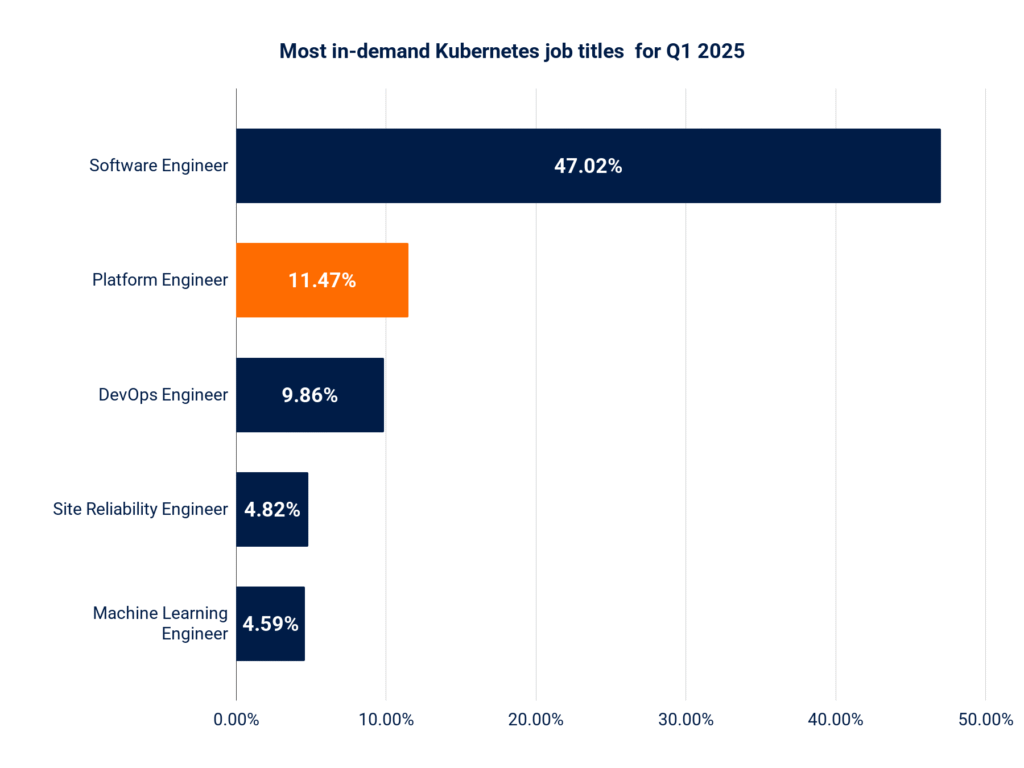
Of the total jobs that require Kubernetes experience (since Kube Careers doesn’t publish them otherwise) in Q1 2025:
- Software Engineer roles are the most popular, with 47.02% representation.
- The second most popular Kubernetes role is platform engineer, which makes up 11.47% of the contribution.
- Slightly behind by 2% in popularity were DevOps roles (9.56%).
- The order of popularity then was site reliability engineer (4.81%), machine learning engineer (4.58%), data engineer (3.44%) and DevSecOps engineer (3.21%) roles.
Platform Engineer Roles Have Been More Popular Than DevOps Roles in the Past, but Not as Frequently
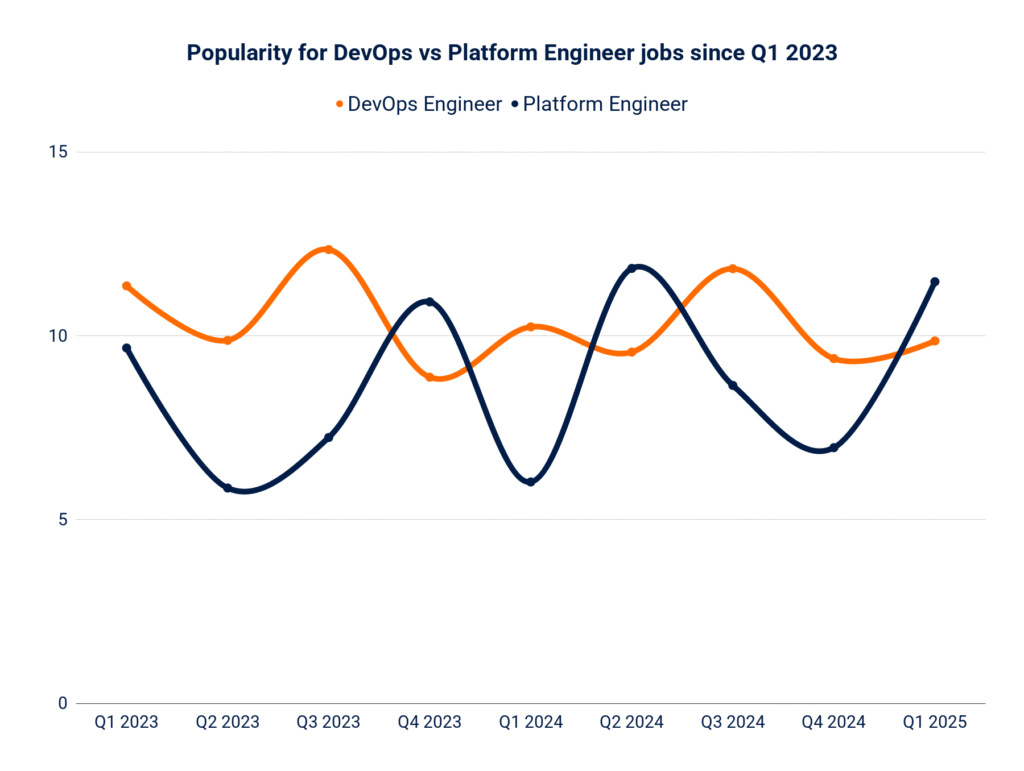
If we look at the popularity of titles for Kubernetes jobs since Q1 2023 (a dataset of two years – eight quarters), we get a clearer picture of the trend:
- Platform engineer positions started to surpass DevOps roles in popularity by the end of 2023 (Q4 2023, to be precise) but fell again in the following quarter.
- In the last six quarters, platform engineer positions have been more popular than DevOps roles for three quarters, meaning popularity has been split between DevOps and platform engineer roles in the last year and a half.
While the frequency of platform engineer roles may not have been high in the past, currently, you are as likely to find a platform engineer vacancy as you would for a DevOps one.
How Much Does a Platform Engineer Get Paid in Q1 2025?
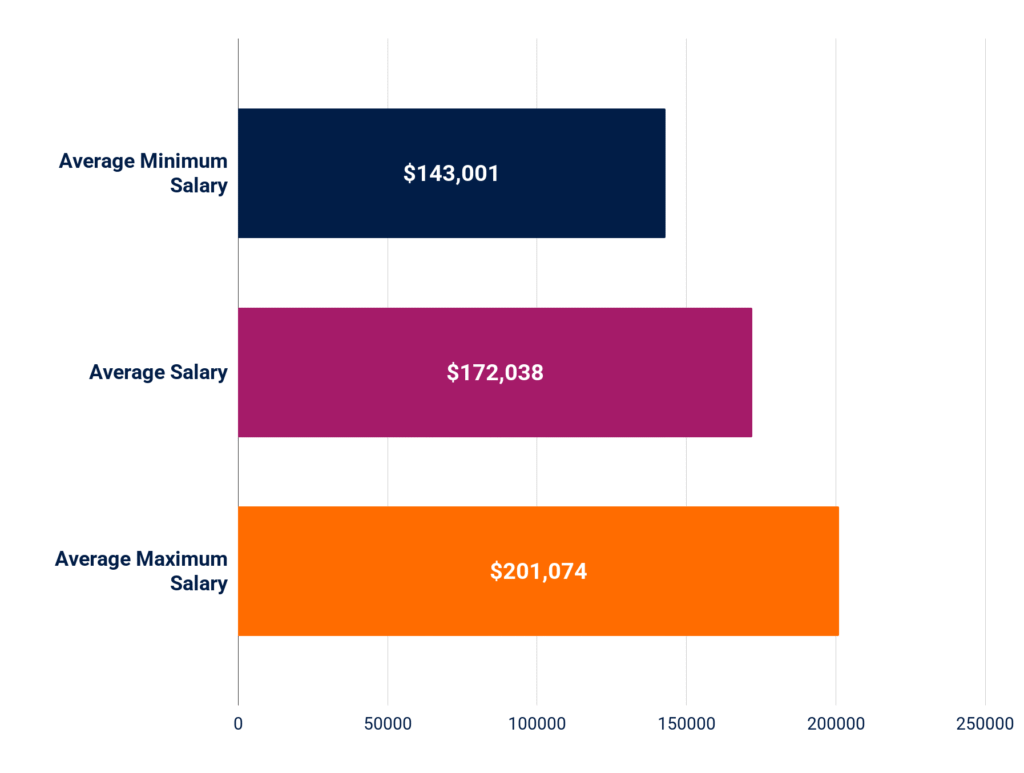
For the first quarter of 2025, the minimum average salary for a platform engineer role is $143,001. The maximum average salary is $201,074, bringing the average salary to $172,038.
Has the Salary for Platform Engineers Grown Year-on-Year? Or Has it Been Stagnant?
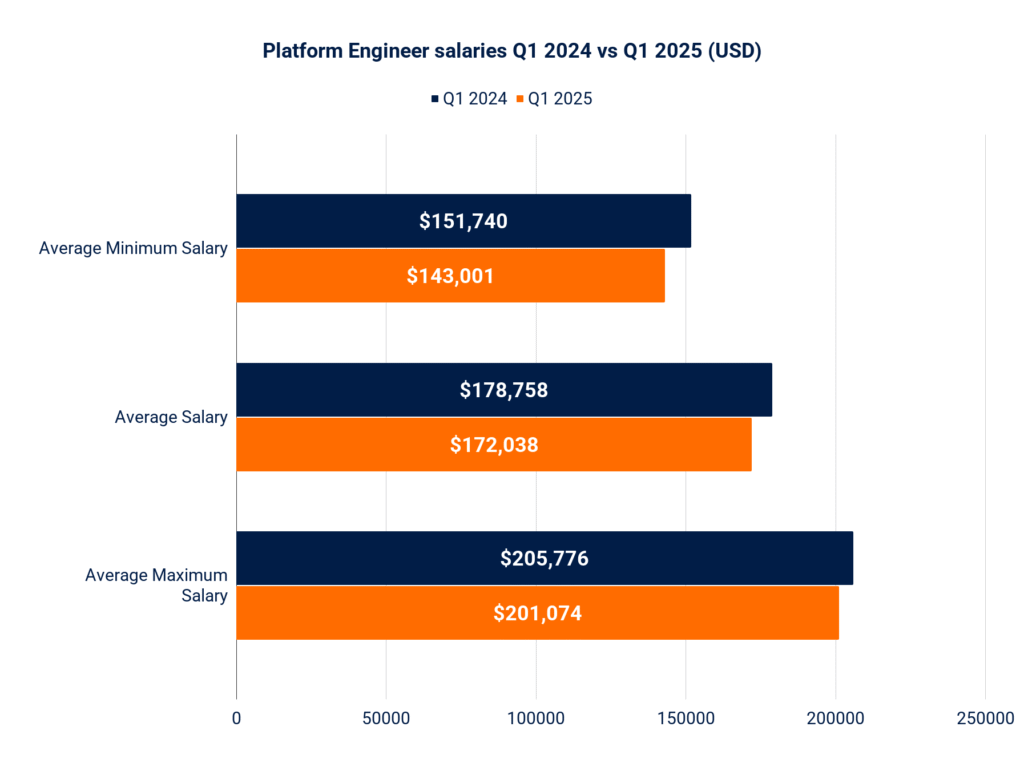
Interestingly, average salaries declined slightly in Q1 2025 compared to the same quarter in 2024.
- The average minimum salary has declined by 6.11%, and the maximum average salary has decreased by 2.33%, bringing the average salary down by 3.90%.
How Does the Average Platform Engineer Salary Compare to Other Job Titles?
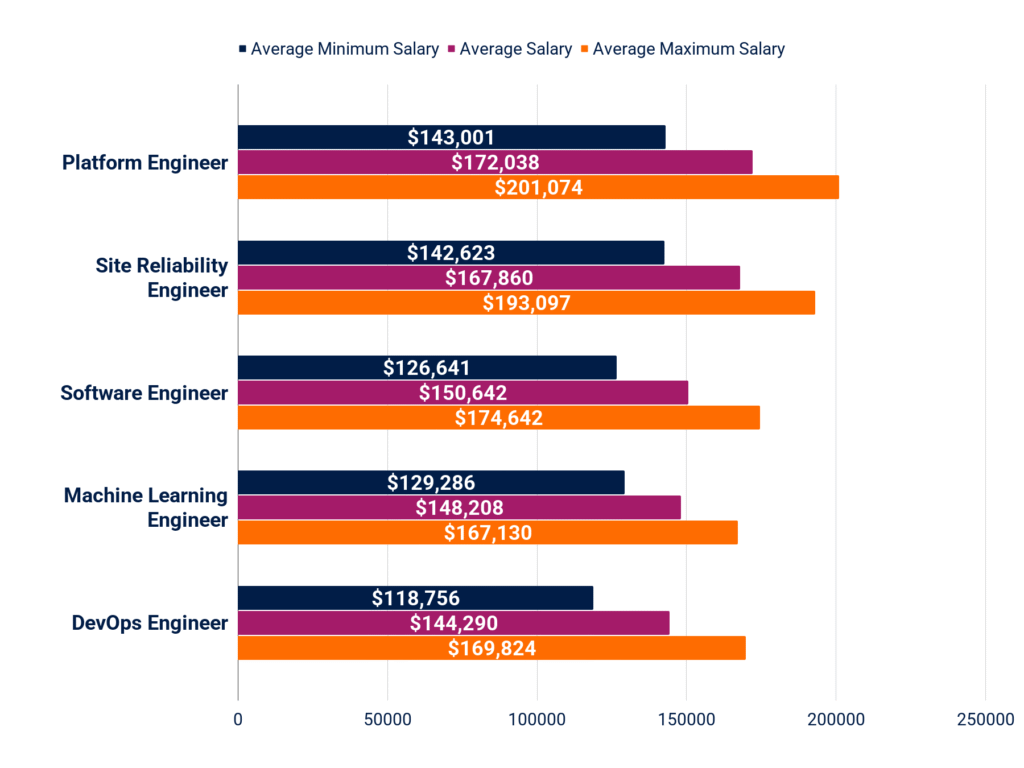
If we compare the average salaries for the most popular job titles in Q1 2025, we find that:
- Platform engineers are paid the highest average salary, at $172,038, which is not only higher by almost 20% than DevOps roles but also better than machine learning engineer(by 16%), software engineer(by 14%), and site reliability engineer roles(by 2%).
- The hierarchy for the minimum average salary starts with platform engineering at the top: Platform engineer ($143,001) > site reliability engineer ($142,623) > machine learning engineer ($129,286) > software engineer ($126,641) > DevOps engineer ($118,756).
Barring DevSecOps positions, Platform engineer roles pay, on average, 2-20% higher average salaries than all the other popular cloud-native job titles.
With Preferred Working Modes, Platform Engineer Roles Require the Most In-Office Presence Across Popular Job Titles
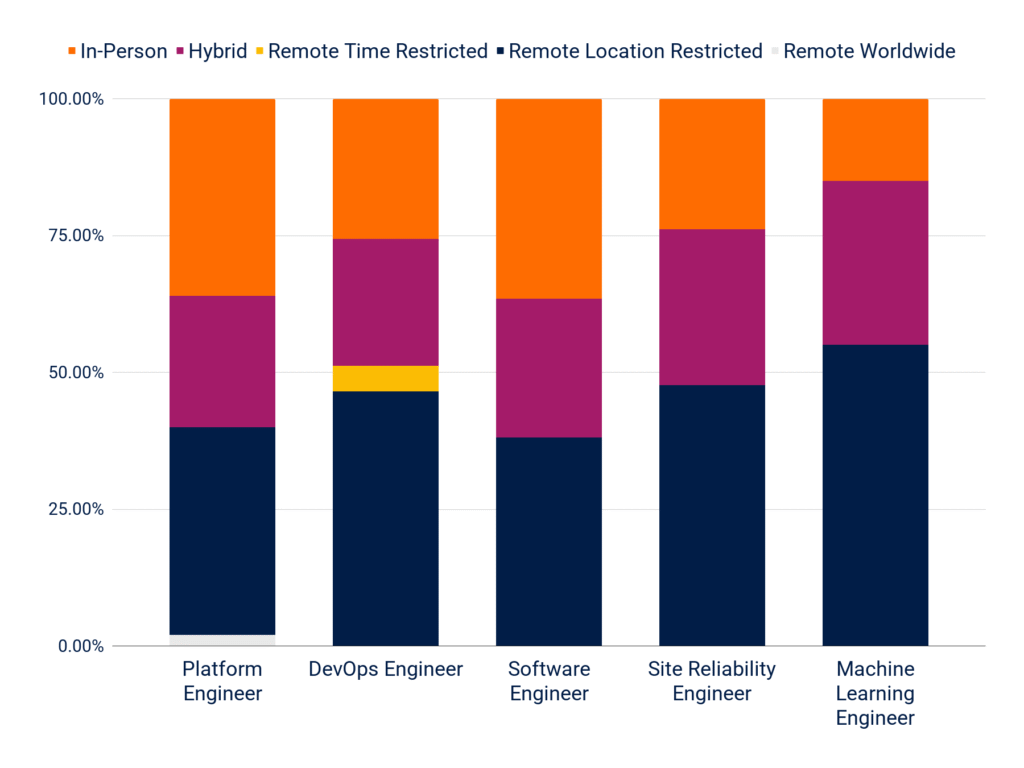
Here are the takeaways when we compare preferred working modes for popular job titles:
- While 40% of platform roles are remote, 24% are hybrid, while the remaining 36% require in-office presence 5 days a week — the most compared to other job titles.
- The hierarchy for remote-friendly job titles starts with machine learning engineer as 55% of these jobs are remote, followed by site reliability engineer (47.62%) > DevOps engineer (46.51%) > platform engineer (38.05%) > software engineer (38%) roles.
- The order for hybrid-friendly roles is: machine learning engineer (30%) > site reliability engineer (28.57%) > software engineer (25.37%) > platform engineer (24%) > DevOps engineer (23.26%).
Have Most Platform Engineer Roles Been Senior-Level Since One-Third of These Require an In-Office Presence? How Does This Compare to Other Job Titles?
Yes, and no!
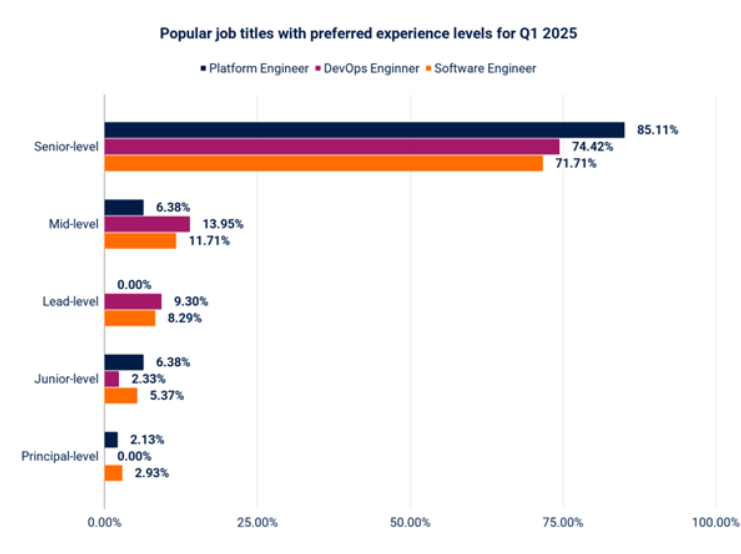
Here are the key takeaways when we compare popular job titles across preferred experience levels:
- A staggering 85.1% of the platform engineer roles are senior, which is 10% higher than what it is for DevOps roles and 14% higher than software engineer roles.
- Consequently, mid-level experience roles were almost half for platform engineer positions compared to DevOps and software engineer counterparts.
- What’s interesting is that while there were no lead-level platform engineer roles, there were three times as many junior roles as DevOps positions.
Summary
Platform engineering is on a double-digit growth trajectory for at least the next decade. Job frequency is on par with DevOps roles, while the average pay is considerably higher than that of most cloud-native roles.
Do note that most of these roles require senior-level experience and the most in-office presence (comparatively).
What do you think? How difficult is it to get a platform engineering role? Let us know.
